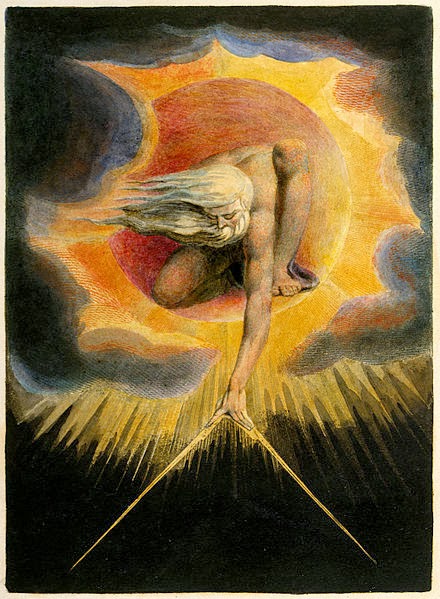 |
| The Ancient of Days (1794) by William Blake. |
The Deutsche Bibelgesellschaft has an excellent edition of the Lutherbibel that includes an informative Sach– Und Worterklärungen section–––basically the equivalent of the “Bible Dictionary” in the LDS edition of the Bible. Besides the fact that Baal is correctly identified as a rain and fertility deity, and not a “Sun-god,” in the Sach– Und Worterklärungen (any BYU ANES majors out there know what I’m talking about), here are some other really cool entries.
Leviatan–––Bildliche Verkörperung der Mächte, die sich Gottes Schöpfermacht entgegenstellen und von ihm gesiegt werden. Der Leviatan wird vorgestellt als Seeungerheuer (“Drache”) mit mehreren Köpfen, das sich zusammen mit der Urflut (Meer) gegen Gott auflehnt (Ps 74, 13-14). Die Schilderung Hiob 40, 25-41, 26 zeichnet deutlich das Krokodil, doch auch mit den Farben eines Urdrachen.
[Leviathan–––Artistic embodiment of the powers that stand opposed to God’s creative power and will be conquered by him. The Leviathan is represented as a sea monster (“Dragon”) with many heads, that with the primeval flood (sea) rebelled against God (Ps 74, 13-14). The depiction in Job 40, 25-41, 26 clearly shows the crocodile, but with the colors of a primeval dragon.]
Meer–––Das Meer ist für das Alte Testament Sinnbild der gottfeindlichen, die Schöpfung und ihre Ordnung bedrohenden Macht. Der Schöpfungsvorgang selbst kann darum als Kampf gegen das “Urmeer” beschrieben werden, das im Meerdrachen (Leviatan) persönlich Gestalt annimmit (Hiob 26, 12-13; 38, 8-11).
[Sea–––The sea is a symbol of ungodly power in the Old Testament that threatens creation and its order. The creation process can therefore be described as a fight against the primeval sea that is associated with the personalized shape (Leviathan) of a sea dragon (Job 26, 12-13; 38, 8-11).]
Rahab–––(Hiob 9, 13; 26, 12; Ps 89, 11) Name für das mythische Seeungeheuer als Inbegriff der widergöttlichen Macht (Leviatan). Er wird auch auf Ägypten als den Feind des Gottesvolkes übertragen (Jes 30, 7).
[Rahab–––(Job 9, 13; 26, 12; Ps 89, 11) The name for the mythological sea monster that is the epitome of anti-godly power (Leviathan). It is also transformed in Egypt as an enemy of God’s people (Isaiah 30, 7).]
With this in mind, consider what Joseph Smith had to say about this in 1844.
You ask the learned doctors why they say the world was made out of nothing, and they will answer, “Doesn’t the Bible say he created the world?” And they infer, from the word create, that it must have been made out of nothing. Now, the word create came from the word baurau [bār’ā], which does not mean to create out of nothing; it means to organize; the same as a man would organize materials and build a ship. Hence we infer that God had materials to organize the world out of chaos—chaotic matter, which is element, and in which dwells all the glory. Element had an existence from the time He had. The pure principles of element are principles which can never be destroyed; they may be organized and re-organized, but not destroyed. They had no beginning and can have no end.
(Source: http://www.lds.org/ensign/1971/04/the-king-follett-sermon)
Although he didn’t use the same mythological language used by the people of the ancient Near East, including the ancient Israelites, Joseph taught the same concept. God creates by overcoming chaos and setting the cosmos in order. That’s what creation is. There’s nothing ex nihilo about it.
Just for good measure, here’s “Papa” Franz Josef Haydn’s overture to his oratorio Die Schöpfung (The Creation), titled, appropriately, “Die Vorstellung des Chaos” (“The Representation of Chaos”).